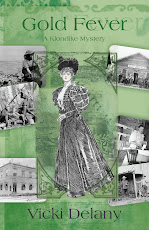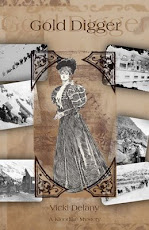 |
| Kayaking the Nile, outside Juba, South Sudan |
Juba, South Sudan: 2011; Dawson City, Yukon: 1898
While I’ve been spending the last few weeks visiting my daughter in Juba, South Sudan, I’ve been working on Gold Web, the fourth Klondike Gold Rush mystery novel.
Seems like Juba would hardly be an inspiration, doesn’t it?
But the two places are surprisingly similar.
Take the streets. In Dawson the town flooded so much in the spring of 1897 that the Mounties needed a canoe to get from one building to another across the parade square. The town was built on a flood plain at the joining to two rivers. When it rained the streets turned into muddy passages so deep that the mud might come up to the top of a waggon wheel or to a horse’s knees. In Juba, the streets are mostly unpaved, and unmaintained. Potholes the size of a small car, open manholes, rocks and garbage and debris. I haven’t been here in the rainy season, but I shudder to contemplate.
The people. People from all over the world poured into the Klondike in search of fortune. Most of them were ill-equipped, to say the least, to live in an arctic mining town. The only ones who really made money were those who ‘mined the miners’: dance hall owners, shop owners, etc.
People from all over the world are here in Juba: aid workers from NGOs and foreign governments; people from other African countries setting up business large and small. Kenyans seem to have a monopoly on the car rental and taxi businesses, Eritreans on water delivery; Turks are building the new road to Umulei; Ugandan and Kenyan women staff restaurants and bars. White 4*4s stamped UN fill the streets along with most of the major NGOs. I have met people from Canada, UK, US, Holland, Botswana, Kenya, Germany, Ethiopia, France, South Africa, Sweden, Australia. Most of whom seem to get along in a joyous muddle.
The City. The Klondike was a rough and tumble mining town carved out of the sub-arctic wilderness. People lived in shacks made out of green wood or in canvas tents (in the winter!) and what buildings there were, were constructed with more speed than skill. This city isn’t much different. It was just a garrison town for the Northern forces for the years of the civil war. Only with the CPA in 2005 and the subsequent independence did the city start to grow. And growing it is. Construction is everywhere. Housing is a problem as people are pouring in, not only from other countries as mentioned above to take advantage of the new economic opportunities, but from the countryside. Most housing is still in tin shacks or traditional mud huts.
Environment. Cough. Hack. In Dawson sawdust covered everything, all the time. They were cutting down the forest as fast as possible and turning all that wood into boats and buildings and firewood. In Juba at this time of year not only is dust everywhere, but the farmers are burning their fields and smoke is thick in town. Neither were places for people with breathing difficulties. In Dawson there was one or two public toilets (depending on my sources) for a city of 30,000. No plumbing, no electricity, no telephone (They got electricity and telephone in 1899). In Juba, I don’t know how many public toilets there are but I’ve learned not to leave home without using one. The ‘western’ style houses have private garbage disposal and sanitation removal: the shanties, nope. What do you do without garbage collection or running water? Think about it.
The Wildlife: Zip. Nada. What else happens when the wilderness is destroyed and the people move in.
The future. There was no future for Dawson City. The gold rush ended abruptly in the summer of 1899 and everyone fled for other prospects. The era of the great gold rushes was over: most mining would be done by companies now, with industrial equipment and scientific innovations. By the early 20th century the city was pretty much a ghost town. It’s revived today, but the population is about 8,000 (it had been 30,000 in summer 1898) and it’s mostly a tourist town, reliving its glory days.
For Juba? There are difficulties to be sure: Crime is on the increase; war with the North still threatens; there are ethic and regional disputes. But everyone is optimistic and the energy is fantastic. I’m looking forward to coming back in a year or two and seeing how it’s progressed.












Such an interesting comparison of 'frontier towns' - I wouldn't have imagined the similarities. You make us feel the dusty heat and smell the pungent air.
ReplyDelete